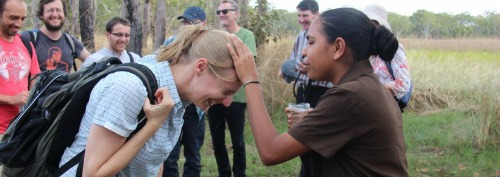31 May 2012
Northern Australia Hub researchers recently took part in Indigenous cross-cultural awareness training at Charles Darwin University and Graham Kenyon’s property near Humpty Doo in the Northern Territory. 
Following the hub’s inaugural researcher forum at the end of May, 16 researchers spent the morning with Don Christopherson, who has family links in both north west Arnhem Land and Kakadu National Park.
Don provided participants with an overview of the history of colonisation in the Northern Territory from an Indigenous perspective, and an introduction to the issues of culture, kinship and relationships to country that are central to Indigenous people.
In the afternoon, the group visited Graham Kenyon on his property, “Pudakul”, outside of Darwin, where he and his family run cultural tours. The property is surrounded by Adelaide River wetland, and the afternoon began with Graham’s daughter Dee-Dee welcoming the researchers to country with a head-wetting ceremony.
The group were then taken on a guided bush tucker and medicine walk, followed by a talk from Graham about his background and the roles and responsibilities in his culture. The afternoon concluded with weaving lessons, spear throwing and a cup of tea with freshly baked damper.
Northern Australia Hub Knowledge Broker Jaana Dielenberg said the day was an invaluable experience, particularly for researchers who haven’t worked closely with Indigenous people before.
“People really enjoyed the opportunity to chat informally with Graham and his family and to hear about how influential their customs are in their lives. It’s important for researchers who are working with Indigenous people to understand that,” Jaana said.
“Graham has a long history of involvement in park management, and hearing about his experiences highlighted the wealth of knowledge Indigenous rangers and people have to offer.”
Want to know more about the Resilient Landscapes Hub's activities and our research into practical solutions to environmental problems? Stay informed about activities, research, publications, events and more through the Hub newsletter.